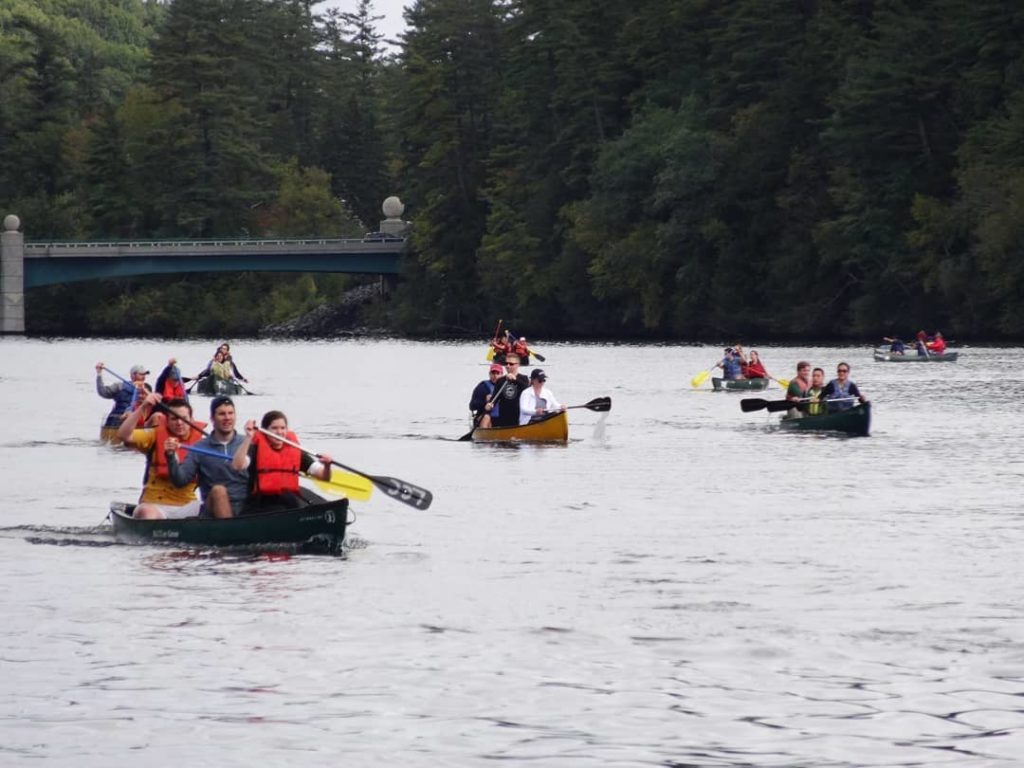Here at Ellin Lolis Consulting, our goal is to ensure that our clients choose MBA programs they love for life — after all, you can only do one MBA!
In addition to its idyllic setting in Hanover, NH, Tuck leads the way when it comes to recruiting, ranking #1 of top 10 schools in employment at graduation and 3 months after graduation. However, landing a job in a foreign country post-MBA can be challenging, which is why it’s important to have the right school and the right support when planning your career transition.
That’s why we got in touch with graduate Karlston Nasser to get an insider’s view of what life is really like at Tuck and how the program helped him launch a successful career in the United States.
Mr. Nasser has more than 20 years of business experience in Brazil and other emerging markets and 18 years of real estate experience with Hines, which started when he joined the firm in 1999 as the South America Regional Controller in Sao Paulo, responsible for financial reporting, tax and the start of operations in Brazil and Argentina. Prior to that, Mr. Nasser was the Manager of Financial Reporting for Whirlpool’s Latin American Appliance Group, also in Brazil.
After receiving his MBA in 2006, Mr. Nasser re-joined Hines in the Emerging Markets Group in Houston, where he had several roles in Hines’ growing investment management business, overseeing separate accounts adding to more than US$2.4 billion in equity invested in developments and acquisitions in the industrial, condo, mixed-use and office sectors. He was also involved in the structuring of Hines’ first investments in India with the $480 million Hines India Fund.

(Karlston Nasser, Graduate of the Tuck School of Business)
Since 2009, Mr. Nasser has been fully dedicated to existing and prospective Brazilian vehicles, having worked with some of the world’s largest institutional investors in over 45 separate investments.
Mr. Nasser holds a BBA from Universidade Sao Judas Tadeu (Brazil) and an MBA from The Tuck School of Business at Dartmouth, where he is a member of the Latin American Council, advising the school in its initiatives in Latin America.
Ellin Lolis: How did you end up choosing to attend Tuck?
Karlston Nasser: I was very methodical in selecting the schools I wanted to apply to. For me, the ideal program would: 1) not be in a big city (I’ve always lived in Sao Paulo and wanted a change); 2) have great job placement success for international students; 3) offer more than just academics (e.g. I went with my wife and 2 children and wanted a place known for its network of support for partners and families) and 4) because I was changing careers, I looked for a strong, truly dedicated alumni network that would help me connect with industry leaders, I was looking past the cliche buzzwords almost all schools use.
Once I started checking those boxes, Tuck stood out as a clear winner. Although the last point is hard to confirm before you finally get there and test it, I had a strong feeling that Tuck was going to deliver on that based on my conversations before I applied.
EL: What most surprised you about Tuck after arriving on campus?
KN: Without a doubt, it was the way the first-year curriculum and especially the first few weeks and activities were organized to prepare students for success in the critical internship job search, while helping foreign students like me to adapt to new demands.

(Tuck students on the Environmental, Social, and Governance (ESG) investing trek to New York City develop valuable contacts and glean insider insights to launch careers in the emerging impact investing field, Photo courtesy of @tuckschool on Instagram)
I knew Tuck was 1 of the 2 most rigorous programs in the US (together with Darden back then), but I wondered how the school would let students “phase-in” before the recruiting fun would begin. I was positively surprised when just a few weeks into the fall semester, multiple functions and company presentations would fill the day and push students to prioritize. There were a myriad of options for all career aspirations and I thought to myself “if these great companies, big and small, domestic and international come here to this picturesque place in the Green Mountains in the heart of New England, there must be something about this school that recruiters must love.”
But I must admit I had to drastically adjust my routine and revamp my time-management skills in a huge way, which, in hindsight, I think it was all part of the plan. Tuck only offers one degree, full-time residential MBA, and that is as demanding (and as complete) as it can get.
EL: What were your classes like?
KN: The first year curriculum is very much geared to provide the core foundational skills that all students need to both succeed in the other subjects that build on the early fall classes and prepare for interviews/cases with a grasp of the fundamentals of business. Classes are very fast paced but well-coordinated at the same time.
The second year is considerably more bespoke, when students will either focus on full-time job search or, if they already have a job offer, deepen their studies in topics of personal or professional interest, by choosing elective courses and by engaging with professors on special projects, start-up ideas or the like.
A day during my first year would be: classes in the morning >> lunch and company presentations >> study group meetings to revisit any unclear topics (members would ensure no one was left behind on key teachings) >> more recruiter presentations or company sponsored cocktails/happy-hour (the schools that presented during lunch stay to mingle with students in the afternoon over drinks) >> some non-academic activity (club meeting, dinner with visiting executives, sports) >> time with the family or friends >> more group meetings to prep for the next day, sometimes late into the night.
A day during my second year >> classes in the morning or afternoon >> school presentations or a special event/visitor >> club activities (the Beer Club, fittingly founded the year I started, was very popular) >> networking and more career focused activities on your own.
EL: How did you balance classes and involvement in clubs during your MBA?
KN: My approach was not too different from that of most older students. I wanted to make the most of the academic experience because I would probably never go back to a class environment again, so that was my opportunity where open, rich and engaging discussions with classmates from all corners of the world and professors that really are a their peak in terms of research in their respective fields was possible.
I was not obsessed with perfect grades. I understood that bonding with my classmates would be the only way to carry those valuable connections and true friendships into the decades after the MBA, and I was right. I would say I dedicated 60% to classes and academics and 40% to other activities.

(Members of the Tuck Outdoors Club participate in the group’s annual signature event, Photo courtesy of @tuckschool on Instagram)
If anyone asks about my best memories, I would say they were in the activities outside of class. The visiting executive program was of special interest to me. Successful Tuck alums would come back to Tuck to teach a case, to present or to recruit and because that special place that is Hanover, NH is in a rural setting and relatively remote, they have no option other than staying the night and unwinding with students over drinks or dinner. An invaluable experience that was as enriching as the classes and other activities.
EL: What did you end up doing for your summer internship?
KN: I worked 2 summer jobs, which is unusual. The first was in corporate finance with Sara Lee Group in Winston-Salem, NC, back then part of a larger group that owned the baking goods company and Haynes Brands (Champion Sportwear, etc). I was given a project that was completed much earlier than the company expected, and I knew I didn’t want to work in consumer goods.
I had also applied to participate in one of the Tuck Global Consulting teams before the start of the summer, but by the time I started with Sara Lee I still was not assigned to a case. Then sometime during the summer I was invited to join a team of 4 classmates to work on a case for Dupont Europe, helping their crop protection business expand in Turkey in preparation for the country’s accession to the European Union. This was a fantastic and truly immersive experience. We hired an interpreter and all 4 of us travelled to different parts of the country for three weeks to collect and process data that would help formulate a strategy to best position the global agrochemical American company to succeed in Turkey. The challenge was for Dupont Turkey to quickly adapt to the higher levels of quality and efficient use of pesticides as is done in Western Europe, if Turkey were to ultimately join the trade bloc. So my summer was a mix of corporate finance and consulting.
EL: How important was your internship in landing the job you wanted after your MBA?
KN: Going into the MBA I was not focused on corporate finance or consulting careers, I wanted to do real estate investment management, but the summer experiences indirectly helped consolidate my interest to work in an international capacity. I wanted to go back to the industry I worked prior to Tuck, but in a client-facing, business generation role but I was not able to find an internship in international real estate, so I opted to explore other industries, and I don’t regret it.

(Employment statistics for Tuck’s most recent graduating class, courtesy of the Tuck 2018 employment report)
I felt very confident that I would have the time and the opportunity to research and connect with alumni or recruiters during my 2nd year that would open the door to my dream job. Tuck is not an obvious place to specialize in real estate but the school’s reputation of providing a comprehensive general management education is so strong that a wide range of real estate investment management firms either go there to recruit or post jobs.
EL: What was the process like to get a job in the United States? Do you have any tips for current or prospective MBA students who would also like to work abroad after the MBA?
KN: I learned very early how important it was and how much time investing in networking would be needed for international students like me to land a job in the US. Most companies are very specific and disclose if they will or will not consider students without permanent work authorization, the good thing is that the obvious recruiters of MBA talent, especially the large, global organizations, accept all applicants.
But the political winds do change how recruiters look at international students as it determines how successful they will be retaining new hires (lottery for H1-B visas, for example). I wanted to, first, spend some time outside of Brazil and second, grow in the real estate sector. I was lucky to be able to do both after Tuck.
To answer your question, it was a “qualified” easy process. If I had wanted a traditional MBA career (consulting or banking, for example) I would have done it much quicker, but because I wanted real estate, it took longer. I had 2 job offers to stay in the US but ultimately ended up re-joining Hines in their investment management group in Houston, where I’ve been for the past 13 years.
EL: What was the best experience you had during your MBA?
KN: I have always been globally curious, so I was intensely involved in getting to know how business gets done in different parts of the world from the practitioners: my classmates. They were just as happy to tell me about their lives as I was open to talk about mine.

(Tuck’s class profile for its most recent class, courtesy of the Tuck website)
Tuck is approximately 35% international, so there was of course a balance. I wanted to learn about business in the US too, and the discussions thrived in an academic setting, greatly helped by Tuck’s location. So, in summary, it was the collective input from super-interesting people, with sometimes completely different aspirations, whom I had the great privilege to spend some 20+ months with.
EL: Overall, what has been your experience interacting with the Tuck alumni community in the US?
KN: It has been fantastic. It is not an overstatement that Tuck has the most loyal alumni. I can confirm this after spending 13 years in the workforce in the US and comparing notes with friends and colleagues from other schools.
The amount of time that most Tuck grads spend giving back (going back to Tuck as a visiting executive like I do, answering the phone and going out of their way to meet and help other Tuckies) is higher than average. Every school has their strengths but I see a difference with Tuck, the alumni network is self-reinforcing in the dedication to genuinely keep the spirit alive. It may be because the school is very selective or because of the class size.

A real-life example, when I travel for business or pleasure, I invariably take my tennis racquet and reach out in advance to the Tuck community in my destination. Someone will either play or will know someone who does, it is an excuse to connect but it always works. Then, from tennis comes an invitation to drinks or lunch or dinner, even breakfast at the hotel lobby! And it all started with Tuck.
EL: Do you have any final advice for recently admitted or prospective MBA students?
KN: Of course. Think about how many times in your life you will have a chance to take a “life-break”, look at your past, plan your future and act on it, in an environment that will help you become a better you. Taking the plunge to get your MBA will allow you to do just that. This is not only an investment in education, it is also an opportunity to explore personal growth, and classes are just a component of the larger experience. It is not cheap (be it time or money) but it is up to you to make the absolute most of it.
EL: Thank you so much for your time, Karlston. You’ve definitely helped us gain greater insights into the Tuck MBA and your experience building a highly successful career in the US after graduation!
My team and I pride ourselves on being with you at every stage of the process as you apply to an elite program, giving you the confidence that you are taking the right steps toward your future with the information you need not only to get accepted into a top MBA, but to find a program you love for life. That’s why I truly enjoyed talking with Arthur, and bringing this information to you.
If you need help planning school visits, designing an application strategy, or even if you’re just starting the application process and aren’t sure exactly what to do next, my team and I can help! Schedule your free consultation with us today.
Real MBA Essays That Got People In
School-specific sample essays that got our clients accepted






